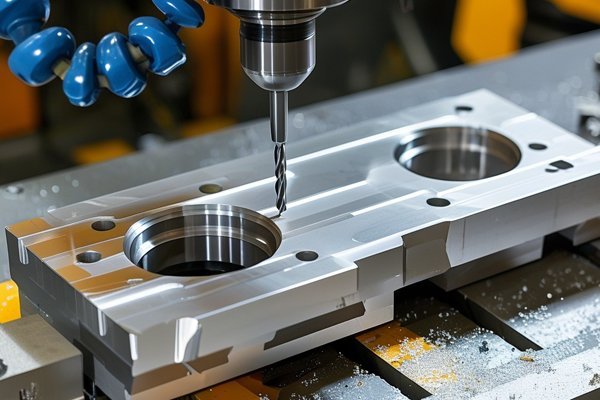Did you know that over 80% of manufacturing businesses face challenges when dealing with special materials in CNC processing? Whether it’s due to their unique properties, demanding tolerances, or specific needs for handling, special materials pose a significant hurdle in conventional machining. As industries evolve and product requirements become increasingly specialized, the demand for effective CNC processing solutions has never been greater.
This blog will explore how CNC (Computer Numerical Control) processing solutions address the numerous challenges associated with special materials, providing insights for manufacturers looking to optimize their operations and enhance their product quality. From metals like titanium and high-strength alloys to advanced polymers and composites, we’ll delve into detailed solutions that highlight the importance of advanced CNC technologies in maintaining manufacturing excellence.
Understanding Special Materials in CNC Processing
Before diving into solutions, it’s essential to define what “special materials” encompass. Typically, these materials are characterized by:
These characteristics make special materials challenging to work with; improper handling during CNC processing can result in defects, increased production costs, and wasted material.
Solutions to CNC Processing Difficulties with Special Materials
Tool Selection and Design:
The first step in overcoming processing difficulties is selecting the right tooling. Advanced material-specific tooling, such as polycrystalline diamond (PCD) and carbide tools, is critical for machining hard materials like titanium and superalloys. These materials have increased tool life and improved efficiency.
Coating Technologies:
Tool coatings such as titanium aluminum nitride (TiAlN) and diamond-like carbon (DLC) can significantly enhance tool performance by increasing hardness and reducing friction. The right coating helps tools cut more effectively through tough materials, decreasing heat generated during the machining process.
Adjusting Spindle Speeds and Feed Rates:
Tailoring spindle speed and feed rates according to the material type can drastically influence machining outcomes. Special materials often require lower speeds and carefully calculated feed rates to generate less heat and prevent tool wear.
Combining Cutting Strategies:
Adopting strategies such as peck drilling for deeper holes or intermittent cutting can reduce thermal buildup, thereby prolonging tool life and maintaining dimensional accuracy.
Using Advanced Coolants:

Implementing specialized coolant systems—such as minimum quantity lubrication (MQL) or high-pressure coolant—can effectively reduce temperature levels and improve tool performance when machining challenging materials.
Cryogenic Cooling Techniques:
Cryogenic cooling using liquid nitrogen can significantly enhance the machinability of materials like Inconel or titanium. This approach allows for lower thermal deformation, thus maintaining tight tolerances.
Utilizing CAD/CAM Software:
Computer-Aided Design (CAD) and Computer-Aided Manufacturing (CAM) systems play a pivotal role in optimizing CNC machining processes. This technology allows manufacturers to simulate machining operations and adjust parameters based on material properties before actual execution, eliminating costly mistakes.
3D Printing Integration:
Incorporating 3D printing technologies in the early stages of production enables designers to create prototypes with special materials without investing heavily in traditional tooling. This rapid prototyping can significantly expedite the design and testing phases, leading to quicker time-to-market.
Skill Development:
Training personnel on the particular behaviors of special materials, and the specific CNC techniques required for their successful machining is crucial. Skilled operators can troubleshoot and adapt processes in real-time, ensuring optimum outcomes.
Cross-Training Teams:
Creating cross-functional teams that are adept in both machining and materials science fosters innovation. These teams can collaborate to develop new methods tailored to emerging special materials, ensuring your company stays ahead in the industry.
Implementing Advanced Sensors:
Integrating real-time monitoring systems using IoT (Internet of Things) technology can enhance overall efficiency. Sensors can track temperature, vibration, and cutting forces, facilitating immediate adjustments if abnormalities arise.
Feedback Loops:
A closed-loop quality control process allows for continuous improvement. Gathering data from machining processes provides valuable insights into areas needing refinement, ensuring ongoing process optimization.
Special materials present unique challenges in CNC processing, but by leveraging advanced technology, precision machining techniques, and continuous learning, manufacturers can navigate these complexities with ease. The strategies discussed—ranging from advanced tooling and adjusted machining parameters to innovative cooling systems—demonstrate a multifaceted approach to overcoming the hurdles of special materials.
As industries modernize and the demand for specialized components surges, investing in these advanced CNC processing solutions will not only enhance product quality but also secure a competitive advantage in the marketplace. Understanding how to effectively handle special materials in CNC machining is not just important; it’s essential for any manufacturer looking to thrive in today’s rapidly evolving industrial landscape.
Embracing these methodologies will ensure that your operations are built for success as we move towards an even more technologically driven future. Consider this blog not only as a knowledge resource but as a call to action to enhance your CNC operations and innovate within your supply chains for better results.






